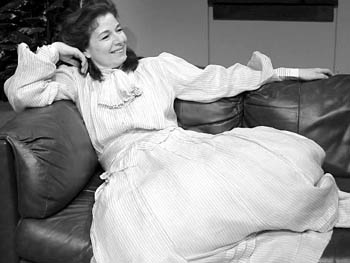![[Metroactive Stage]](/stage/gifs/stage468.gif)
[ Stage Index | Silicon Valley | Metroactive Home | Archives ]

Bird of Prey: Diane Tasca plays a domineering Irina Arkadina in 'The Seagull.' 'Seagull' Soars at the Pear Small company does justice to Chekhov's big ideas By Marianne Messina ANTON CHEKHOV'S The Seagull is an actor's tightrope: it's all about balance. Each character attempts to establish equilibrium among internal forces while the play stretches from the tragic yearning of man's ideals to the comic irony of mankind in action. At a recent Pear Avenue Theatre performance, most of the 10 characters (large cast in a small hall) managed to find their centers of gravity. For example, when novice actress Nina performs in the brooding Konstantin's conceptual (or "decadent" as his mother calls it) play-within-a-play, real-life actress Keite Davis skates deftly between melodrama (one wants to laugh) and substance (one wants to contemplate). Throughout the play, some of the funniest lines tumble out in the most tragic or passionate moments. And what passionate moments, from embraces and gropings to at least one kiss so electric the audience squirmed with voyeur's guilt. There's a delicious sequence in which the actress Irina Arkadina (Diane Tasca) controls her lover, Boris Trigorin, by backing him over a table, growling deep, cat-throated words of seduction and creeping stealthily on top of him for the "kill" (the Shakespearean sense). Also a treat are the incestuous, Hamlet-referencing tangos between Irina and her son, Konstantin (played heavily by Joshua Hayden). In this fin-de-siècle play about artists sparring with entanglements, jealousy and existential angst, it takes a few of the characters a while to hit their stride, partly because of some trouble projecting through the early ensemble scenes. John Baldwin's Doctor Yevgeny Dorn is an affable family friend who wants to dispense comfort, but whose comprehension of his friends' complexities never surpasses "they're such sensitive creatures." Gradually, Baldwin clarifies this tension--the helpless healer--and brings it to a head in his most touching (even while humorous and ironic) moment, a scene with Konstantin in which the doctor has no words at all. Louis Graham plays a winsome windbag of a Piotr Sorin (Irina's brother): "Even at 60, one would rather be alive than not." Only at the end of the play, when Piotr falls asleep and it feels as if some laughter has gone out of the world, do we recognize the power of Graham's performance. On the other hand, Kurt Gravenhorst's Trigorin never totally jells. Trigorin must be demure as a celebrity author who doubts his self-worth; he must be debonair enough for Irina to love (or adorn herself with--judging from Tasca's unflappable Irina) yet spineless enough for Irina to control; he must possess the vulnerability and charisma of Bill to Nina's Monica, and the equally Clintonesque moral apathy of a cad. Though Gravenhorst doesn't always pull the nuances off, he comes out strong in the seduction of Nina, making what could have played as mere midlife crisis a believable study in hope. The company opts for period costuming--sometimes a relief these days--and you could almost have watched the entire play without noticing that stuffed Victorian arm chairs were, in fact, wooden folding chairs. Once again the Pear distracts you from its Peared-down set design by using that old bit of legerdemain, the quality performance.
The Seagull, a Pear Avenue Theatre production, plays Thursday-Saturday at 8pm and Sunday at 2pm (Sept. 28 and Oct. 12) or 7pm (Oct. 5) through Oct. 12 at the Pear Avenue Theatre, 1220 Pear Ave., Mountain View. Tickets are $15-$20. (650.254.1148)
Send a letter to the editor about this story to letters@metronews.com. [ Silicon Valley | Metroactive Home | Archives ]
|
From the September 25-October 1, 2003 issue of Metro, Silicon Valley's Weekly Newspaper.
Copyright © Metro Publishing Inc. Metroactive is affiliated with the Boulevards Network.
For more information about the San Jose/Silicon Valley area, visit sanjose.com.